Living in Việt Nam, Pt. 5 - Cough and Consequences

January 2025
"Are you cold?"
Back in Texas, I would often go without a jacket when it was a little cold and get this comment all the time. I like the weather a little chilly.
But I am currently in Việt Nam, and the temperature is 76 Fahrenheit.
My principal has driven me to the city for a late evening treat of... coffee. And he has brought along one of my co-teachers and her family, partly so that she can translate for us. We sit outside by a tree-lined pond, and everyone is bundled up except for me. To me, this is a perfect temperature.
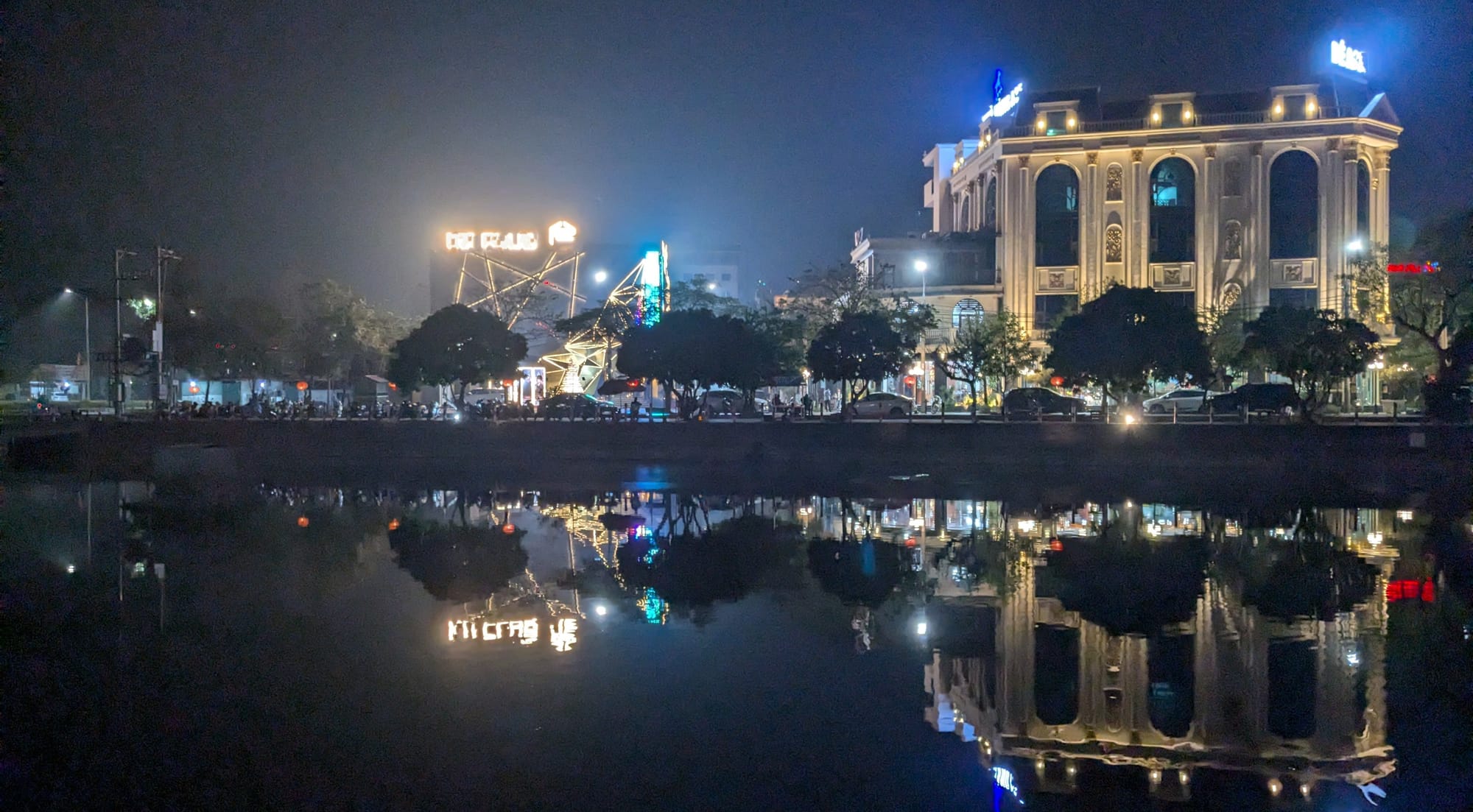
"Have you tried cà phê muô'i before?"
I chuckle. "Em yêu cà phê muô'i!!" I love salt coffee.
I really do. Vietnamese filtered coffee sits at the bottom of the glass, unsweetened but thick as syrup; it is never bitter, but naturally "sweet" with notes of dark chocolate and cherry. On top of this is heaped ice and a rich, fluffy foam of salted cream. Stirred together, it's an addictive combination of flavors.
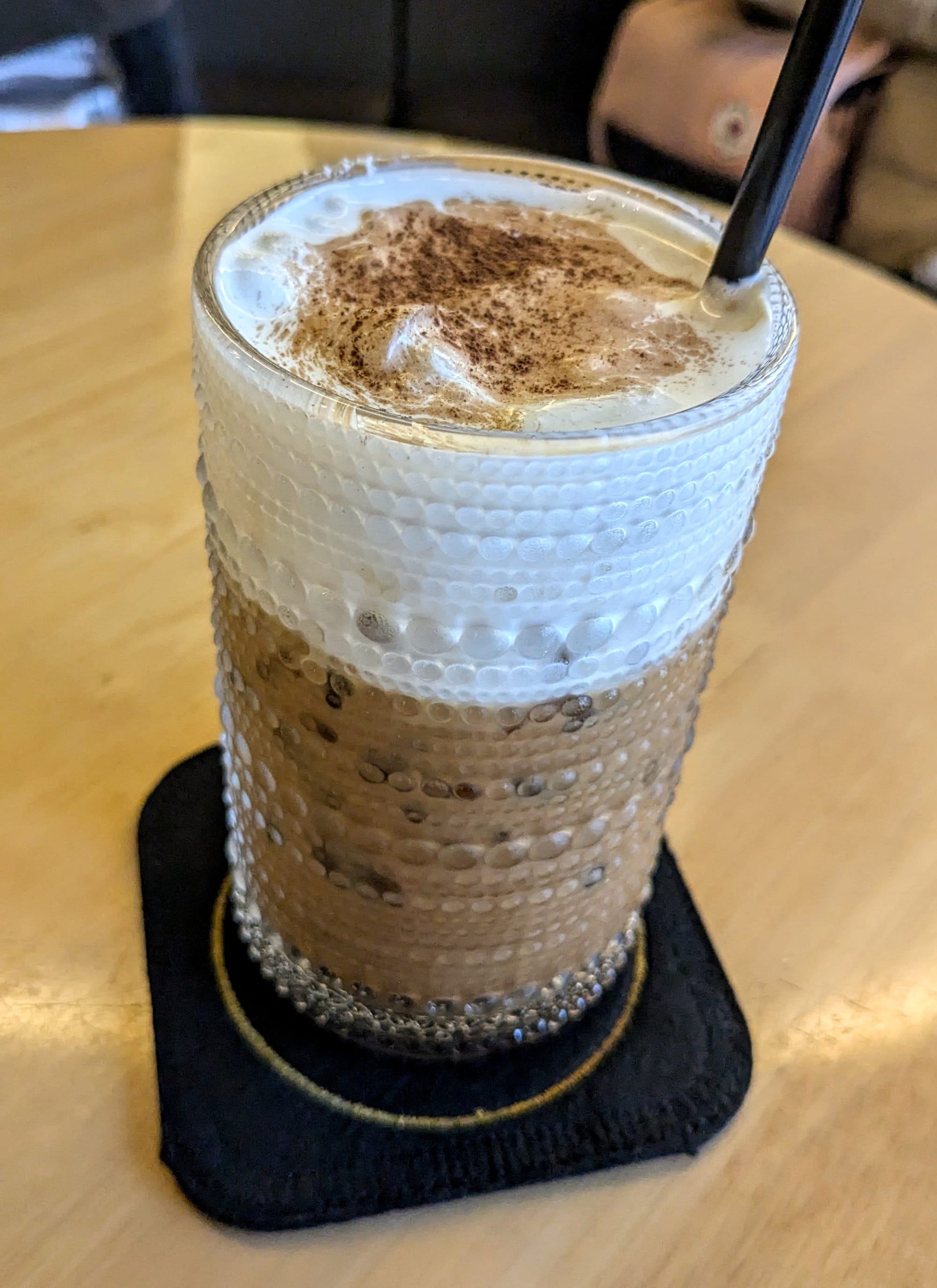
"Do you often drink coffee in the evening?"
I laugh. What? No, this was your idea, I think to myself.
"No, I wouldn't sleep! I usually drink coffee in the morning."
They laugh. I wonder if I sound like I'm from 'Opposite World'. Coffee culture here is evening-centric; outside of the cities, most coffee shops open infuriatingly late. Too late for a morning - or even after lunch - pick-me-up.
"Are you sure you're not cold?"
They are visibly uncomfortable just looking at my bear arms in the gentle, evening breeze. I make a note to wear a jacket from then on, even when I know I will sweat a little in it.
When January arrives, the nights get genuinely cold, and I am thankful for my Peace Corps-issued space heater, and a quilt leant to me by my head English teacher, which at first I thought unnecessary.
Coughing starts to be a part of the background noise of classrooms. The students and teachers often wear masks even when they are not actually sick themselves but have someone sick at home. But in English classes, especially with these students who are so painfully shy that they often speak in the faintest of whispers, we often have to ask them to remove their masks to hear their pronunciation.
One night, I get a sudden fever late in the evening. I toss and turn all night. I break out my hefty Peace Corps medical kit - taking individually-wrapped, generic American medicines - and log my temperature and blood oxygen level. I drink extra water to stay hydrated but have to use the bathroom frequently. My fever breaks before daylight does, but now all I want to do is finally sleep.
Just then, gentle music swells into cheerful existence all around the neighborhood - strings and a playful flute that flits like a butterfly over the rice paddies and then lands... on the desk of a news anchor. It is 5:30 AM. It is time for the morning news.
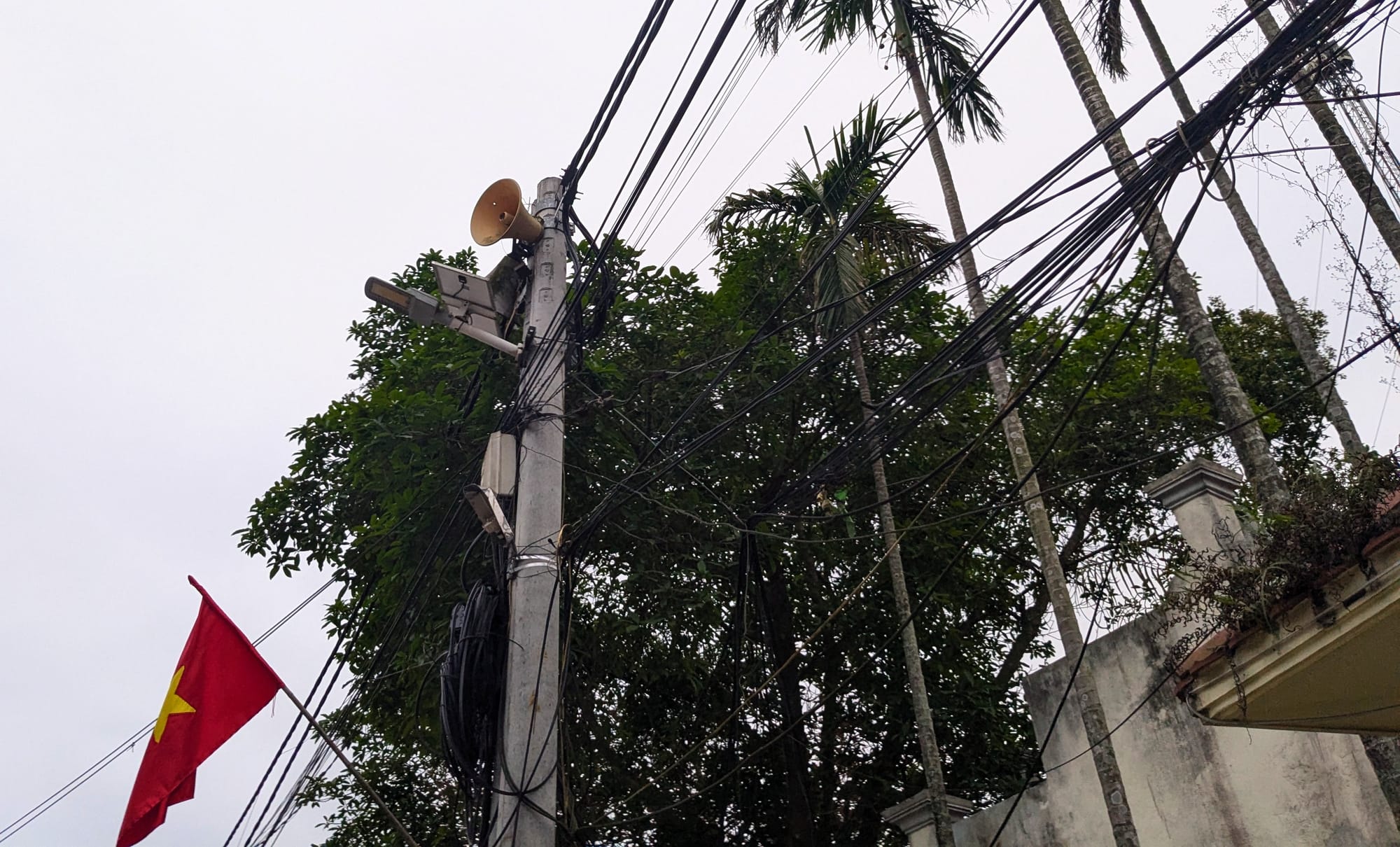
The voice of the news anchor crackles from megaphone-like loudspeakers around the neighborhood. Even though the nearest one to me crosses the school's courtyard, a football field, and a well-maintained cemetery for war veterans, I can hear it clearly. It goes on for an hour most days, and in between news segments nostalgic Vietnamese songs or patriotic marches are sometimes played.
I fumble through my mosquito netting to slap the "On" button of my oscillating fan to provide white noise to drown out the sounds. But the fan just makes me cold again.
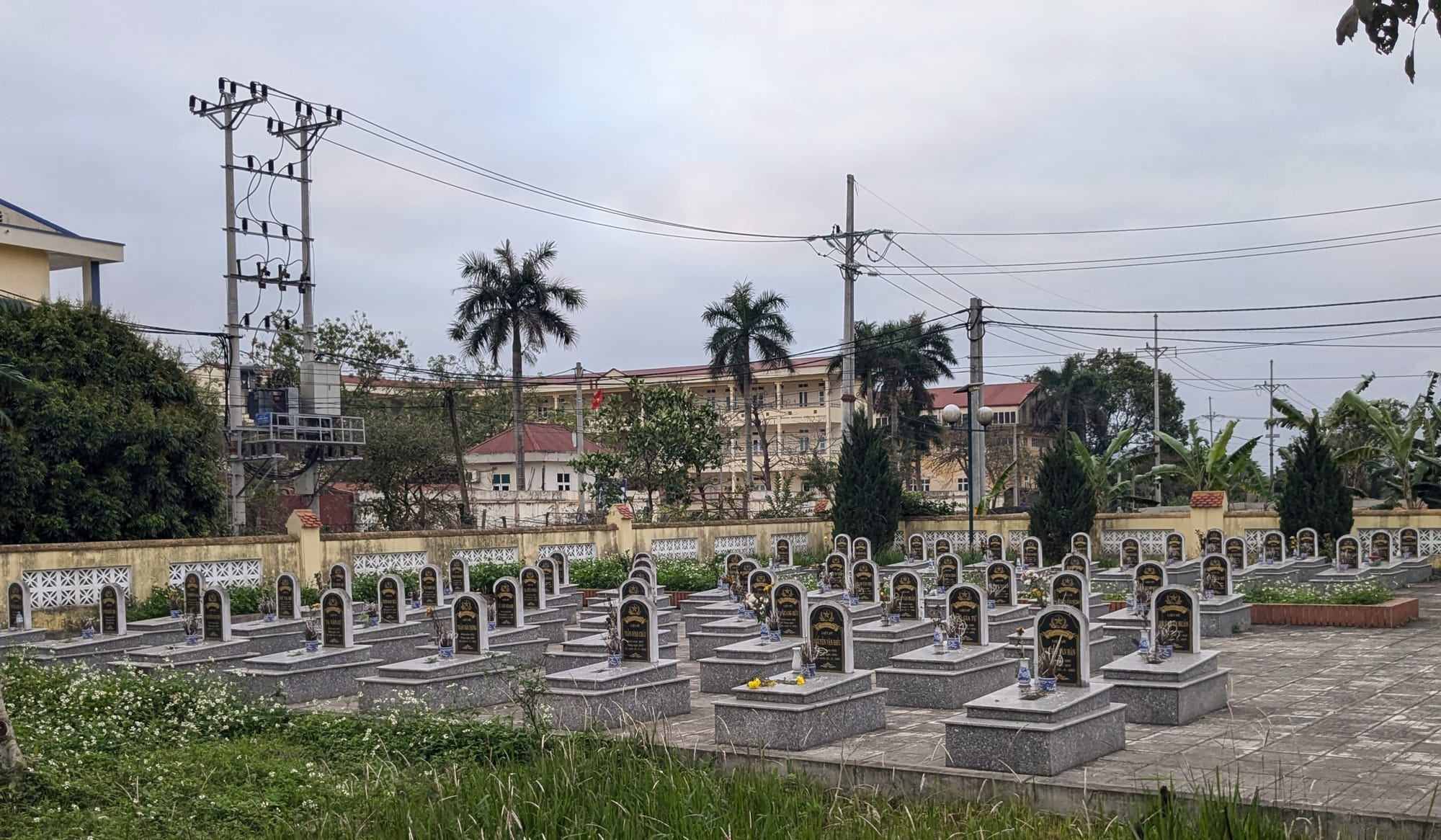
Still unable to sleep, I pull out my phone and send a desperate plea for a sick day to my principals via Zalo. Zalo is Việt Nam's answer to Whatsapp, and also an officially-sanctioned social media platform. It seems that every public school in the country uses it as their primary communication method - even between teachers and their students.
My message is received but everyone soon comes to my room to see whether I am still sick and if I can go to class. Using the Vietnamese I was taught to describe illnesses for this very occasion, I tell everyone I have a cough and a sore throat and need to sleep. For the next few hours, there is a steady stream of concerned teachers and principals; each bring me their own remedy - an assortment of peeled fruit, and a glass of fresh orange juice served warm with ginger.
I am also given lots of advice on how to avoid getting sick in the future. I probably got sick because I wasn't wearing warm enough clothing, or that I didn't air out my room enough, or that I shower in the early mornings rather than after work. Funny, I would have thought germs - or a virus - were to blame....
I give up on sleep and sit at my desk in my room, slowly eating breakfast like a zombie, waiting for lunch when the school will empty for two peaceful hours.
The principal comes and asks if I'm feeling well enough to go to the wedding lunch. It's for the daughter of a school staff member, but everyone was invited to attend. It seems really important to them, but I tell him I badly need rest.
He relents but tells me to rest now and come to the wedding dinner (for the same wedding) after school.
Life returns to normal at the school.
There are five 45-minute periods in the morning, starting at 7:30am. They come rapid-fire with only 5 minutes in between each period. But in Việt Nam, the students do not change classrooms throughout the day: the teachers come to them. The students take more responsibility for their classroom, decorating it, erasing the chalkboard, maintaining a supply of chalk and damp rags for the teacher, and using the remote control to tune the large flat-screen TVs to the HDMI input of their teacher's laptop.

There are also leadership roles in the classroom, including someone who reports bad behavior, someone who takes the classroom's key home with them - it can be a cold morning for a class if this person is late, or staying home sick - and someone who leads the class in greeting their teachers. When the teacher enters the classroom, the students stand and greet him/her in unison and wait for permission to be seated.
In between classes, the teachers congregate in the teachers' room and pour each other tea. Both the kind you drink, and the kind you can find in teachers' rooms everywhere: gossip. The women cluster together on one side of the room, while the men tend to sit on the opposite side.
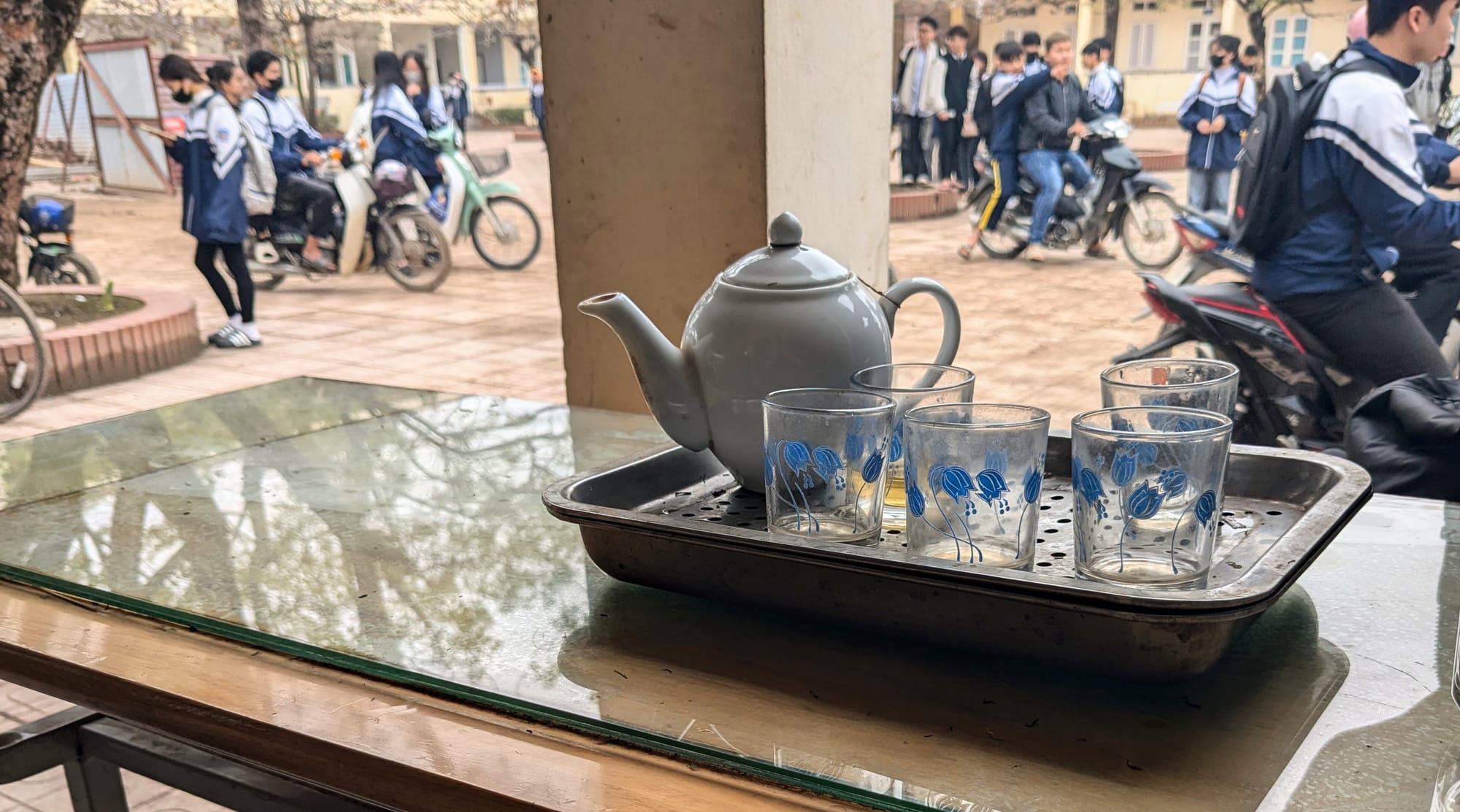
One of the older teachers holds court in the center next to the teapot. He makes sure I have tea and usually points out which female teachers are single. Being unmarried is uncommon here, and he seems to think my being married after two years in Việt Nam is inevitable. Here in rural Việt Nam, running a household - which often includes a vegetable garden and chickens or ducks - while working long hours during the day is difficult for a single person.
It's difficult for me to get to the local market in the mornings before my classes, which is the only time the butchers here are still selling meat. Since the market is an open-air wet market, this is good for freshness, but I struggle to stock enough meat in my small refrigerator.
In the afternoons when school lets out, I often visit the market street where several local aunties sit everyday with a variety of vegetables and fruit on blankets on the ground. The produce is actually phenomenal, and tofu and eggs are available; some weeks these become my primary sources of protein. The only eggs available one day are duck eggs, and they quickly become my preferred eggs - the yolks are huge and rich.

Talking to my program manager at the Peace Corps one day I mention that getting meat is the only real struggle I am having, but that I expect I will soon get used to getting up earlier to go get some.
This comment gets back to my counterparts who ask why I haven't asked them for help. It's a fair point, but what happens next illustrates why perfectly:
One of the school vice principals shows up to my room within an hour with a whole fresh fish.
Another teacher has joined her to translate: "You can prepare it?"
"Uhhh..." I look it over, a little overwhelmed, and see there is a slit running down its belly. Oh good, it's been cleaned. "Yes, I can cook it. Cảm ơn cô. Thank you."
I am often being given gifts of food and taken out to eat, so much so that it makes me a little uncomfortable. From my cultural perspective, I feel like a burden or a freeloader, as they never let me reciprocate directly. They continue to see me as a guest, and they know I am a volunteer teacher - although I receive an allowance for living expenses and can afford to pay for things.
I set about figuring out how to cook the fish. I open the belly, and all of the organs are still inside - it was opened only to remove the toxic gallbladder - leaving everything else is obligatory in a culture where every part is used. The scales and fins are still on the fish, and I only have 1 knife and a pair of scissors in my kitchen.
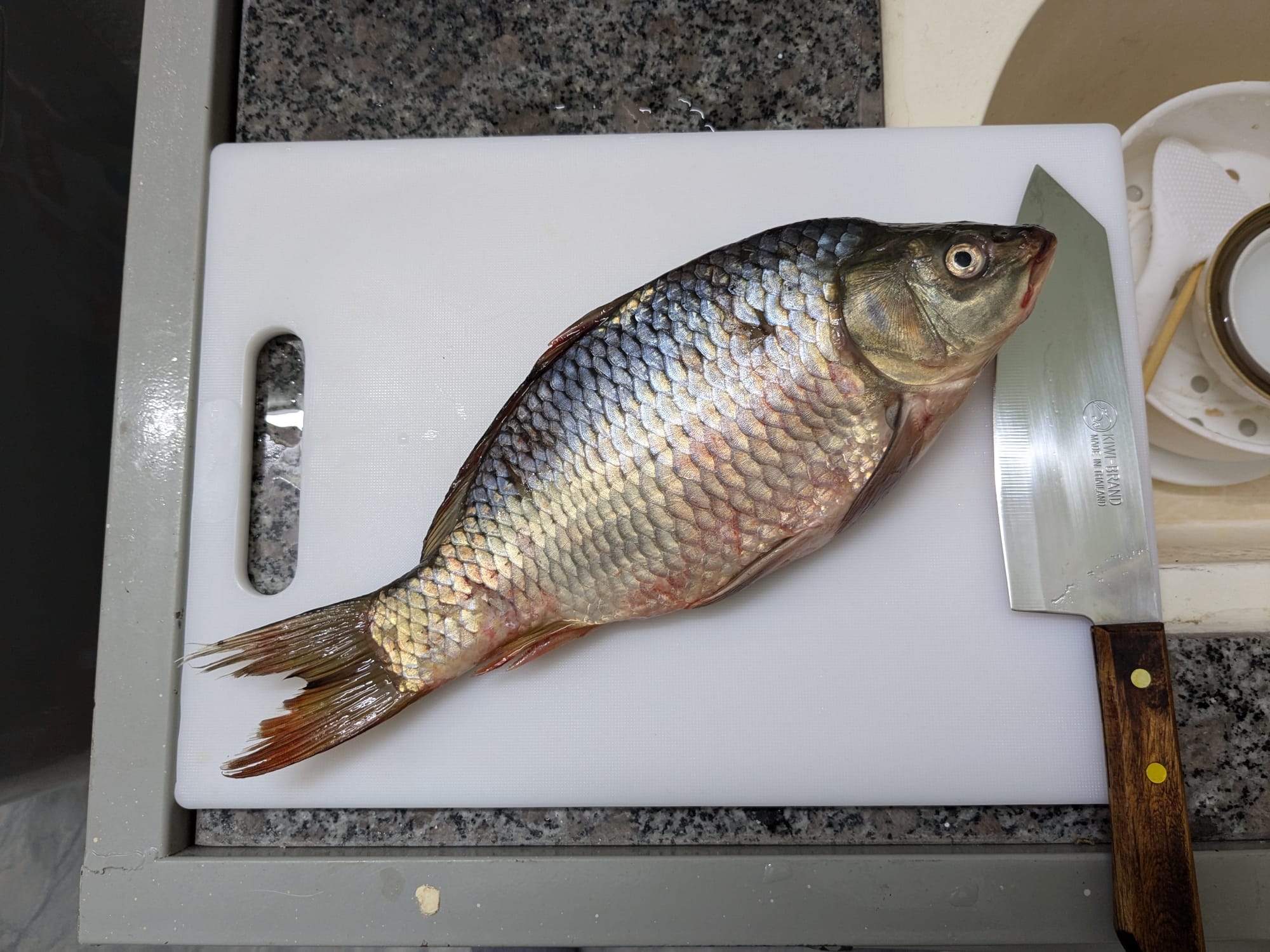
I shake my head with the good humor of mild frustration. When does the solution to a problem become 5 new problems?
But today I am thankful to my grandfather, who showed me how to clean catfish when I was a kid. After a quick Youtube video to remind myself where to cut the jaw, I begin. And then I become paranoid that fish guts down my sink will soon stink up my whole room, so I take the cutting board and a large tub outside, were my chef's knife is soon sending fish scales flying all over the now-empty school courtyard.
Two hours later, after frying the fillets separately - they had to be cut down to fit in my only frying pan - I sit down satisfied with my handiwork. I eat it slowly; there are hundreds of needle like bones throughout. I eat it with salt and lime, but butter is rare here and I have none. It barely feels like a full meal with some rice and steamed veggies.
I feel weirdly exhausted and go to sleep early that evening.
It takes me a few weeks to get used to the teachers' rhythms. Although class ends promptly at the drum, the teachers often take about three minutes after the next periods' drum sounds before making their way to the next class. I like to assume this is stoppage time for the walk back to their breakroom. But the drum makes me anxious to get to class and get started.
I "co-teach" three periods a day, six days a week, all in the mornings. I'm fortunate that my head English teacher schedules it so thoroughly that I usually know what unit and lesson is being taught, but it's still difficult to plan well because I am spread across all classes evenly - all teachers and all grades and all proficiency levels.
High school in Việt Nam comprises of 10th-12th grades. At the very beginning of high school, students take aptitude tests and are placed in groups with different focuses in curriculum. So while all students take math and history and Vietnamese literature and English, "A" group students do extra classes in math and science and are being prepared for entrance into a scientific or engineering university program. "D" group students take extra English courses and are generally the best at English.
The best students genuinely want to learn English for fun, to better enjoy the pop music and TV that they love. Most students are focused on studying English in order to pass university entrance exams, and those exams often only focus on grammar and vocabulary. It's amazing how well some of the students know the rules of English grammar, but then if you try to speak a few simple sentences to them they can't understand it. For most, it is that the Speaking and Listening exercises in their textbooks are too advanced to be practical. For some, it is a pragmatic disinterest: Vietnamese students study long hours every day with lots of homework and extracurricular activities, and English speaking will not affect their grades.
At first, I resist speaking Vietnamese in the classroom. Partly because I don't know very much yet and often don't know how to say what I want to say. When I was certified as a TEFL instructor it was drilled into me to use as much English as possible from Day One...
But whenever I say a few things in Vietnamese, they smile and become a little more curious about me. They may not all want to learn English, but it will be a better two years if they are at least interested in listening to me.
One of my co-teachers tries to turn vocabulary lessons into a two-way street of teaching where the students will instruct me in how to say their vocabulary in Vietnamese.
"This way you can learn Vietnamese at the same time, no?"
I agree half-heartedly but then turn to the very topical lesson at hand and roll my eyes a little; the textbooks' vocabulary usually seems incredibly obtuse to me. When will I need to know how to say artificial intelligence or chatbot in Vietnamese?
I need to know how to say something practical. Like how to tell a barber to cut my hair the way I want. Most men probably get simple haircuts at home; barber shops are always packed with boys getting fade haircuts.
Không fade!
The next day in the afternoon I am extremely worn down again. I start to wonder if I'm malnourished or something. I take my temperature, and convert it to Fahrenheit, and it's about 99.1.
I go to sleep early again and wake up feeling refreshed; other than a cough lingering from my illness five days ago, I feel great.
But then in the evening, I feel tired again, and my temperature is 99.5. I text the Peace Corps medical officer phone - there are two doctors on staff who take turns being on call. Within minutes, I am getting a call back to talk about my symptoms.
The next morning, the doctor calls me while I am in class to tell me a nurse has arrived to take a blood sample from me. I excuse myself from class and introduce myself to a professional-looking man who has just arrived in a white SUV that I've never seen before. Then, I realize he's confused and was being friendly but has no idea who I am.
Behind him, I see that a motorbike has also just entered the school gates. A very young man in a navy windbreaker with a clinic logo gets off the motorbike with a small, insulated lunchbox slung around his shoulder.
Only in Việt Nam, I laugh to myself. We go into the guard's room and sit down on their couch next to their tea set.
The nurse can't find my vein in the crook of my elbow. Against my objections, he decides to try to stick the needle into the back of my hand. Despite looking easier, it's not - the vein is much smaller - and he's unsuccessful.
This isn't the first time this has happened to me in Việt Nam. I'm almost desensitized to being stuck with needles. This is one of the more unglamorous facts of life for a Peace Corps volunteer; you will get all of the vaccines, and you will get your blood drawn whenever the doctor feels like it. Trypanophobics need not apply.
The nurse has now sanitized a second needle and is about to stick it in my arm, when I draw back suddenly and hold up the palm of my hand, saying "Wait!!"
The nurse is startled and looks up at me and then sees the guard next to us. At that moment the sound of the school drum reverberates throughout the small shack. The guard didn't pay us any mind or give us a warning. Class ends when class ends.
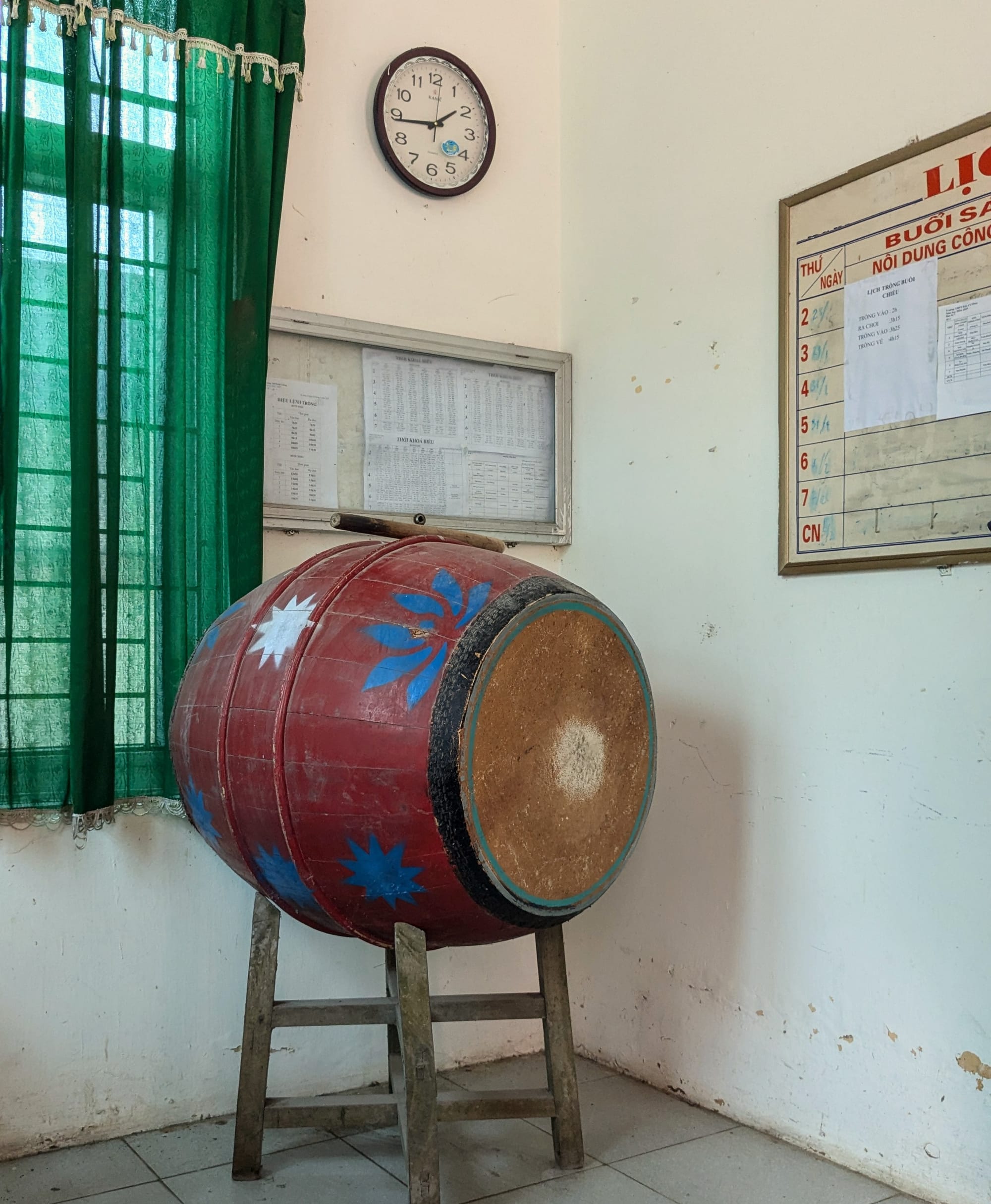
The nurse is stunned from the volume of the giant drum at point blank range.
Only in Việt Nam, I laugh again.
The bloodwork reveals that my body is still fighting an infection. Within a few more hours, prescription antibiotics are delivered. But the doctors also decide to bring me back to the city for a more thorough examination: to find out if there's something else prolonging the infection.
For two days, I find myself back at where it all began once again: the Thă'ng Lợi hotel. I feel a little bit guilty enjoying the time to relax, since for the most part I don't feel sick. But I actually find I really need the rest and end up sleeping a lot.
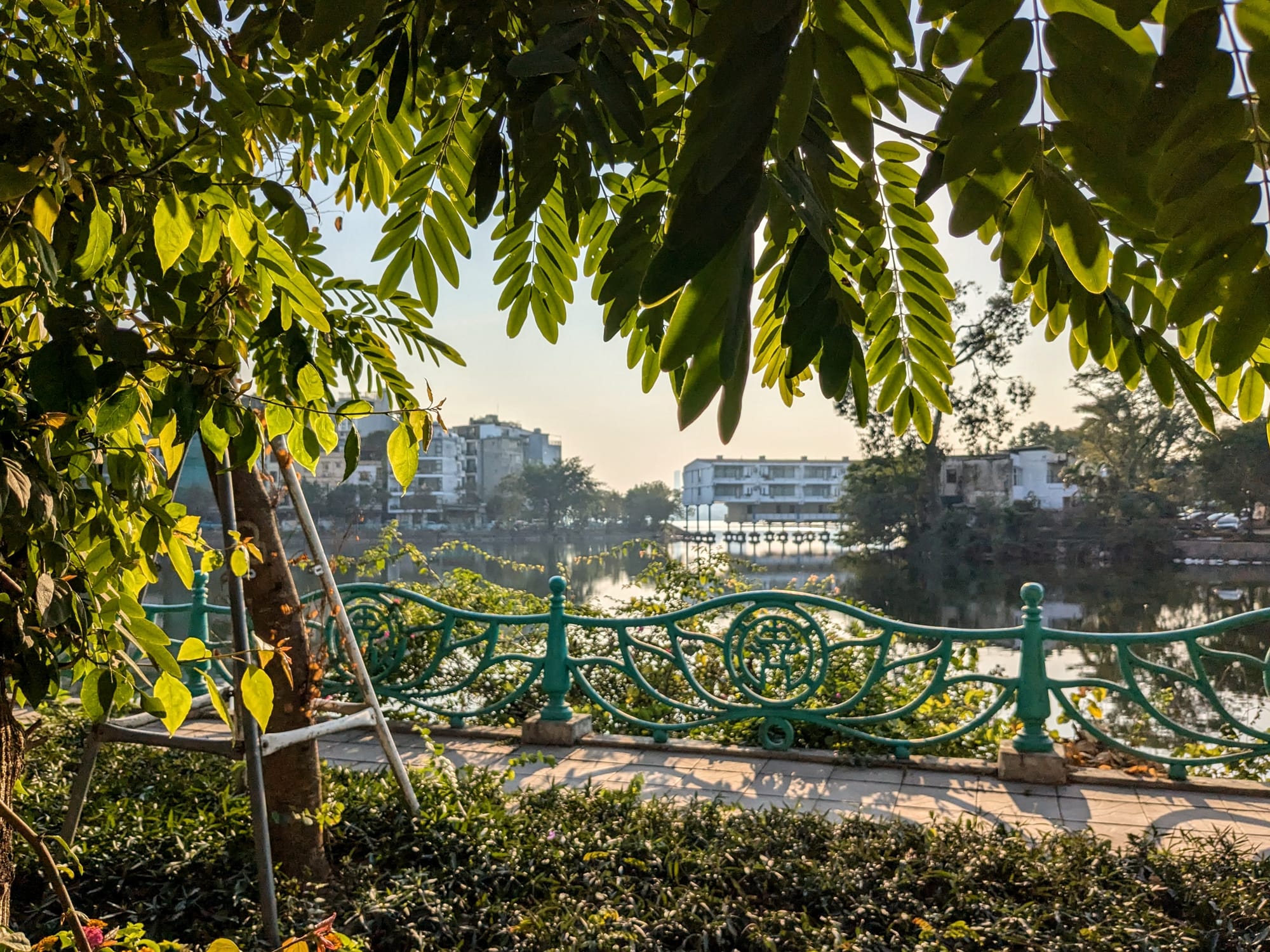
During training, we would occasionally see the VN-01 volunteers around Hà Nội - in the last months of their two years of service - and they were always incredibly very eager to hang out with us, perhaps needing to vent about their struggles. At the time, I thought it was funny that they always wanted to eat at places that were overpriced and filled with foods that resemble American food but always have two ingredients out-of-whack.
Now, after only a month of living at site, I decide the first thing I want to eat is a cheeseburger...

Only a block from the hotel I find a "diner", complete with black-and-white checkered tiles and red faux-leather covered barstools (after you climb a steep and narrow Hà Nội stairwell), and have an amazing burger with real, processed American cheese and perfect onion rings.
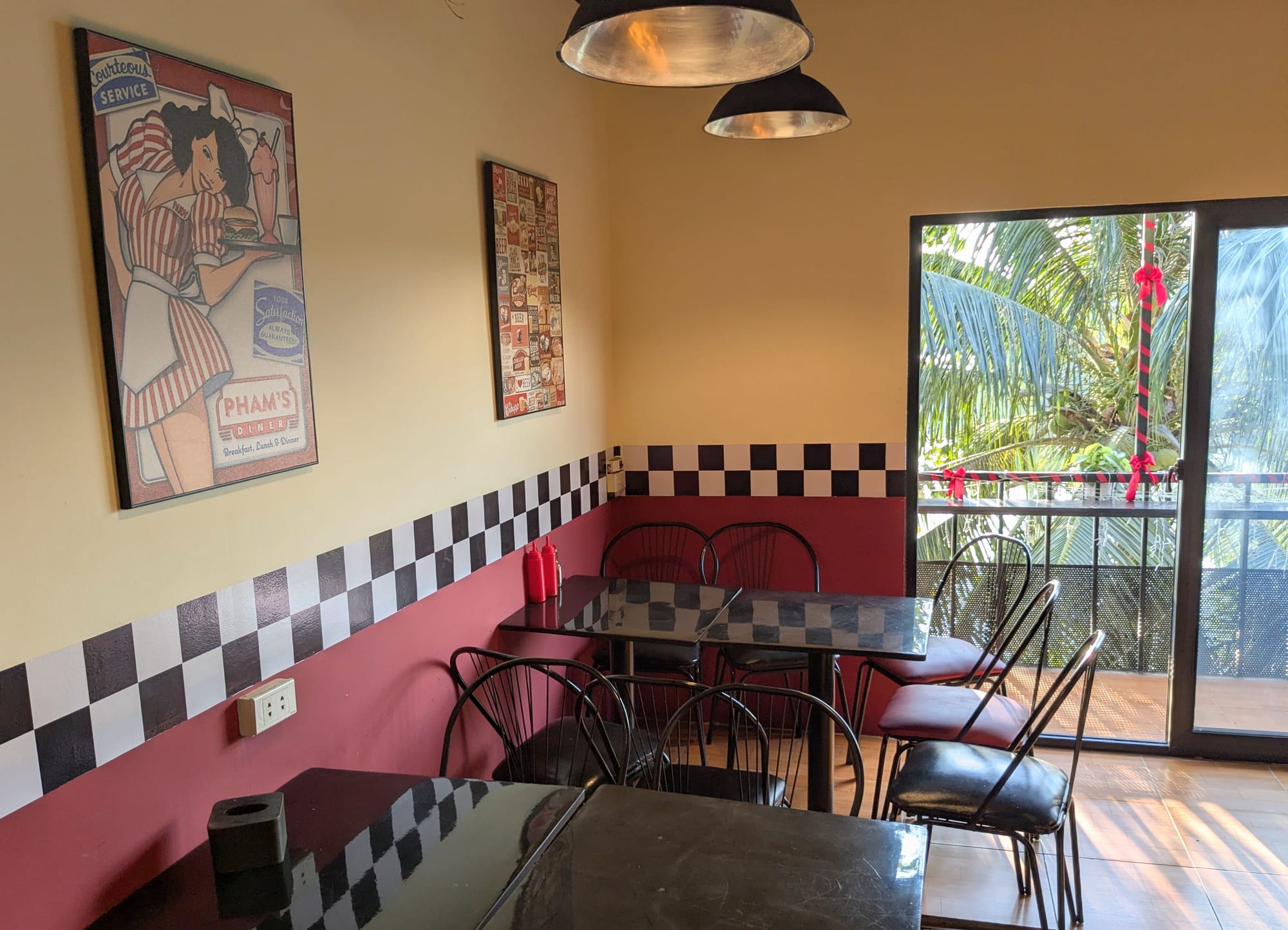
The next day I enter the Peace Corps offices for the first time since training. It's weird coming in without the other volunteers congregating for class. It's quiet.
I run up the four flights of stairs to the doctor's office. It doesn't wind me like it did when I was in training. I've been exercising.
The first thing the doctor wants to do is take my blood pressure. Whoops. I shouldn't have run up those stairs. But my blood pressure is better than it used to be. I have lost 4 more kg in one month at my village, after losing 6 kg during the three months of training. But I don't show any signs of malnourishment.
Two days later, I'm fully recovered and back at site. Three days after that, I check in with the doctor one last time.
I have my energy back. The antibiotic worked immediately. The nasal sprays cleared out my congestion.
"But I still have a little bit of a cough..."
"Oh, don't worry!" the doctor replies cheerfully and confidently. "That's just the air pollution!"
Oh... great...